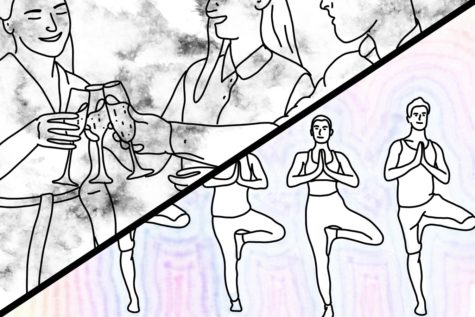OPINION | Tulane’s new sober spaces show improvement

Last September, The Hullabaloo published an article about the need for more sober social outlets at Tulane University. Consistently ranking among the top party schools in the nation, Tulane is notorious for its party culture, including high-risk drinking.
The term “partying” can have many meanings, from attending a Mardi Gras parade to spending all Saturday at a Greek event. As previously noted, drinking and partying are neither unique to Tulane, nor are they inherently illicit activities.
At the same time, “party culture” can lead to a normalization of binge drinking, as indicated by the fact that 54% of Tulane first-year students reported high-risk drinking in 2018. As such, there is ample need for more sober social outlets.
Since writing about this need last September, a number of organizations have offered more sober social activities. In this article, The Hullabaloo intends to highlight this positive progress and advocate for students to become involved in some of these organizations. Sobriety should not be stigmatized, whether one decides to be sober for a night, a week or a year.
Started just last semester, Come As You Are is an organization that specifically recognizes and addresses the need for more sober social outlets. The organization describes itself as “unlike AA or any other club that forces you to be free from alcohol.” Instead, Come As You Are simply offers activities such as picnics at The Fly, meditations, movie nights and dinners.
The goal of Come As You Are is not to convert students to sobriety or demand that students never drink; instead, the organization offers social activities for students who are looking for a casual, alcohol-free event.
Being sober is “a tough experience at Tulane, a heavy-drinking campus,” founder Bella Raoli said. “I wish I had a group of similarly-minded people to spend time with, especially at night while everyone is drinking; I am starting one.”
Additionally, organizations focused on exercise, special interests or religion often offer sober social events for students. CHAARG, for example, is an organization focused on student health and wellness. The club “gets together once a week to try a different workout.” The majority of these workouts are off campus at various studios and fitness centers in New Orleans.
Studies from the American Psychological Association have demonstrated that exercising regularly is beneficial for mental health, especially for young adults and college students. Consequently, CHAARG is especially helpful to students by complementing regular exercise routines with social activities, thereby fostering a sober space for students to socialize.
Other special interest clubs that offer primarily sober social activities include the Tulane Rock Climbing Club, the Gaming and Esports Club, Chess Club, Karate Club, Disc Golf Club and Model United Nations. All of these organizations can be found on Wavesync, with information on how to get involved and meeting times.
Students do not often consider joining religious organizations for their social events. However, many of these organizations offer informal, free activities where students can meet and form friendships in a casual setting.
Tulane Hillel, for example, hosts events such as weekly yoga classes, “The Bachelor” watch parties and even an art market once a semester featuring original student artwork.
Christian organizations such as Tulane Reformed University Fellowship also offer similar events, from bowling at Rock N’ Bowl to an annual crawfish boil. Other religious organizations include the Tulane Baptist Christian Ministries, NOLA Wesley, Chi Alpha Christian Fellowship and the Muslim Students Association.
All students, whether religious or non-religious, are welcome at these events. In fact, many of these religious organizations host events with the intent of providing a fun, sober space for students of all backgrounds to socialize.
Finally, Alcoholics Anonymous meetings are available for students seeking a recovery community in a safe space. Meetings are hosted by the NOLA Wesley United Methodist Campus Center. Meetings are every Monday at 7 p.m. at 7102 Freret St. The meetings “have a collegiate focus, with its members being mostly Tulane or Loyola students or alums, but it is open to all.”
Tulane also offers a recovery community to “support individualized recovery on campus.” It focuses on voluntary abstinence from alcohol and other substances in a safe, student-focused atmosphere that recognizes the individual journey of recovery.
Campus Health also offers eCheckups, a personalized online program to provide feedback about alcohol and marijuana use and help students develop risk reduction strategies. More information about Campus Health resources and non-judgemental safe spaces to discuss alcohol use can be found on the Campus Health website.
In short, drinking is often a normal aspect of many students’ college experiences. However, the “party culture” at Tulane perpetuates unhealthy drinking habits. Students have expressed the desire for more sober spaces to socialize. Come As You Are, CHAARG, special interest clubs and religious organizations all currently offer free social activities that are not alcohol-related.
Interested students should attend some of these organizations’ events. Moving forward, even more organizations should recognize the need for cultivating more inclusive social spaces for the student body.
Your donation will support the student journalists of Tulane University. Your contribution will allow us to purchase equipment and cover our annual website hosting costs.


